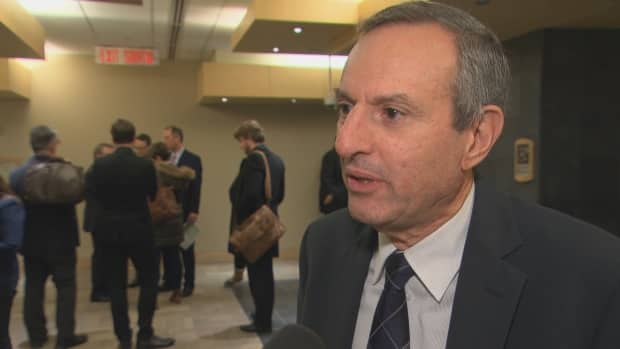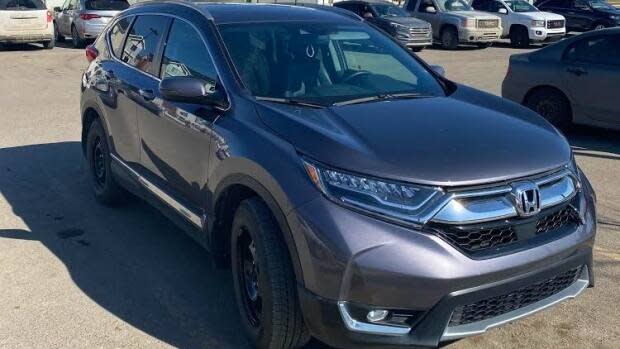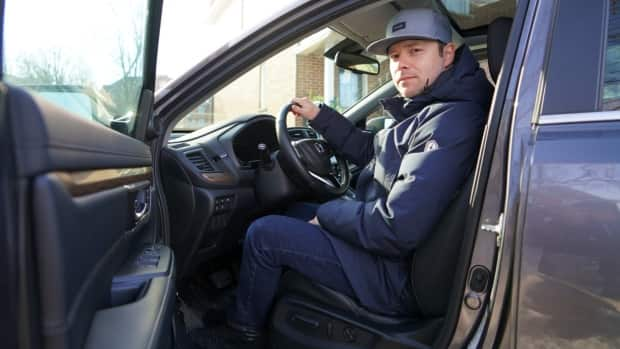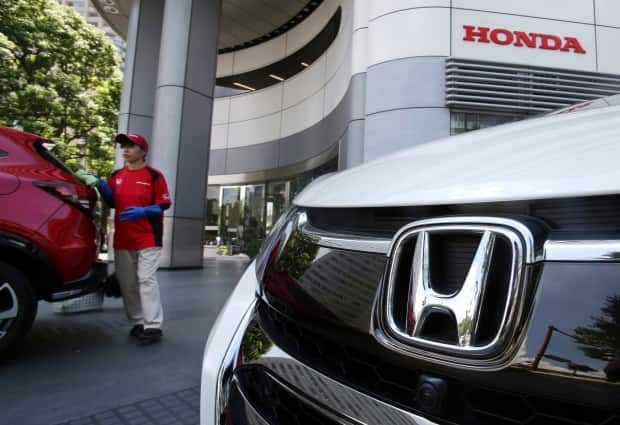'Try not to stop and start' while driving, Honda tells owners stuck with cars not fit for winter
Spring couldn't come fast enough for Jean-François Beaulieu — after spending the freezing Quebec winter driving his young family around in a vehicle that often won't heat up if the temperature drops below –10 C.
Beaulieu, bought his 2017 Honda CR-V EX-L new and noticed almost right away, that when it got cold outside, the car wouldn't heat up inside.
"I feel like I'm driving a three-season car that was not made for Canadian winters," Beaulieu, who paid more than $46,500 for the SUV, told Go Public from his home in Longueuil.
"Winter is solid here four months a year. You need a car that's going to be able to weather that."
Cathy Haugen's Honda won't heat up either when she drives around Calgary — causing her windshield to fog up and not defrost when it's cold and stormy.
"It is a safety hazard," Haugen said of her high-end 2018 CR-V SUV which cost her almost $43,000 new.
"I often have to stop halfway through my drive to get out and clear my windshield."
Complaints posted online to Transport Canada and consumer advocacy groups show Haugen and Beaulieu are two of hundreds of Honda owners stuck with a heating system that doesn't work properly when the temperatures dip on certain popular models — some 2017 and 2018 Honda CR-Vs and the 2016, 2017 and 2018 Honda Civic with the 1.5 L turbo engine.
WATCH | Some Honda owners stuck with cars with faulty heating:
Honda says the lack of heat is part of a problem involving excessive engine oil dilution, and announced a vehicle update campaign in late 2018 that was supposed to fix it. The update included new software, an oil change and, in some cases, a new air conditioning control unit. But automotive consumer advocate George Iny says, in some cases like Beaulieu and Haugen's, it didn't work.
"If they're not going to fix the vehicle, they need to offer people the opportunity to trade out of it or [offer] cash back for what they overpaid for a vehicle without a properly functioning heating system," said Iny, director of the Automobile Protection Association.
Problems like this go unresolved, he says, because some of Canada's safety standards are decades out of date, so Transport Canada doesn't see them as problems. Transport Canada's safety standard for windshield defrosting and defogging, for example, was set back in 1964.

"There are some old standards out there that unfortunately don't provide a minimum level of safety or protection we want today," said Iny.
"The carmakers sometimes hide behind outdated standards."
After Haugen and Beaulieu spoke with Go Public, Honda reached out to both drivers and offered to try and fix the problem.
'Try not to stop and start'
Both Haugen and Beaulieu say they went back and forth with Honda looking for a solution. Both were told if they want their cars to warm up, they should take long drives without stopping.
Highway driving is the best way to get the heat to kick in, the dealerships said.
"Honda gave me tips to get heat, they suggested I don't use Eco mode, I don't turn the fan up too high … and try not to stop and start while driving," said Haugen.
"I asked why I needed tips. Shouldn't I be able to just turn the heat on and have heat? That's when I was told that it was a problem with the engine in my car, that the engine isn't sufficient enough to provide heat in colder climates."

"I mentioned that to the service manager and he said 'Oh, you should see all the problems people in northern Alberta are having where it's even colder.'"
A check of Haugen's vehicle identification number shows she too had the 2018 update done in January 2019. But the heating problem persisted.
The dealership offered to pay for a plug-in car heater, but Haugen says since it only worked when the vehicle was parked in the garage, she declined.
Beaulieu says his experience was equally frustrating.
"The car wasn't better," after the 2018 upgrade, he said. "I tried to get a hold of a Honda, I sent them multiple emails and they said they would check in with my local dealership and get back to me and they never did … It seemed they just didn't want to deal with the problem."

In January 2019, Beaulieu spent $295 on a block heater hoping to fix the problem himself.
That didn't work either. He sent his last complaint to Honda in February 2020 and says he didn't hear back until just last week, after Go Public contacted the company.
Honda has now agreed to remove the block heater, reimburse him for the cost, install a different kind of heater and to try the software update that was done in 2018 again.
Haugen says after she told Honda she planned to Go Public with her complaint, the dealership agreed to update the software again and replace the climate control unit.
"I was surprised. [Before that] they told me over and over that there's nothing wrong with my climate control unit. [They said] it's been a problem with the engine."
Neither will know if the latest fixes actually work until the temperature drops again.
In general, Honda Canada spokesperson John Bordignon says the 1.5 L Turbo engine was, "designed with efficiency in mind" which means the engine does not produce the "high levels of excess heat" as quickly as less efficient engines.
Honda says 90 per cent of vehicles with the heating and oil dilution problems have undergone the update at no cost to drivers, but won't say how many times customers complained the fixes didn't work, only saying that it is "rare."
The company also extended the warranty by a year.
Problem widespread
But the problem seems widespread among owners of these Honda models.
An Automobile Protection Association survey of 152 Honda drivers, mostly from Quebec, found 58 per cent of respondents reported problems with heating the cabin in cold weather and 49 per cent said they had trouble with the windshield or side window defrosting.
The APA survey, conducted December 2020 to March 2021, included 2017 and 2018 CR-Vs and 2016-20 Civics. Of those surveyed, 73 per cent reported that their vehicle had received Honda's product update.

Transport Canada also reviewed the issue after getting dozens of heating complaints for 2017-19 Civics and CR-Vs, and found that the vehicles do meet the minimum requirements set out in the safety regulations.
Iny says that doesn't mean much, since those regulations were set almost 60 years ago. The U.S. National Highway Traffic Safety Administration, Consumer Reports and carcomplaints.com have also received heater complaints from Civic and CR-V owners.
Bordignon, from Honda, says the company has no reason to believe that "this potential issue" affects vehicle safety or "results in any regulatory non-compliance."
In addition to the complaints, Honda owners filed a class-action lawsuit in Canada about the ongoing oil dilution problems that the company says is causing the heating issues.
The lawsuit was settled in March. But Iny says the settlement is a raw deal for drivers. He says there is nothing in it, besides an offer to cover towing charges, that Honda hadn't already offered, leaving some drivers with no solid fix.
"We've never seen anything like it where they didn't fix something and then also papered it off with a settlement like this," Iny said.
Beaulieu joined the class action, but rejected Honda's settlement offer. Both he and Haugen are skeptical the latest fixes by the carmaker will work.
Haugen says she would like to see Canada implement a "lemon law" — guaranteeing drivers protections if their vehicles have obvious manufacturing defects — so she and others have legislation on their side when their purchases go wrong.
Submit your story ideas
Go Public is an investigative news segment on CBC-TV, radio and the web.
We tell your stories, shed light on wrongdoing and hold the powers that be accountable.
If you have a story in the public interest, or if you're an insider with information, contact GoPublic@cbc.ca with your name, contact information and a brief summary. All emails are confidential until you decide to Go Public.
Read more stories by Go Public.


